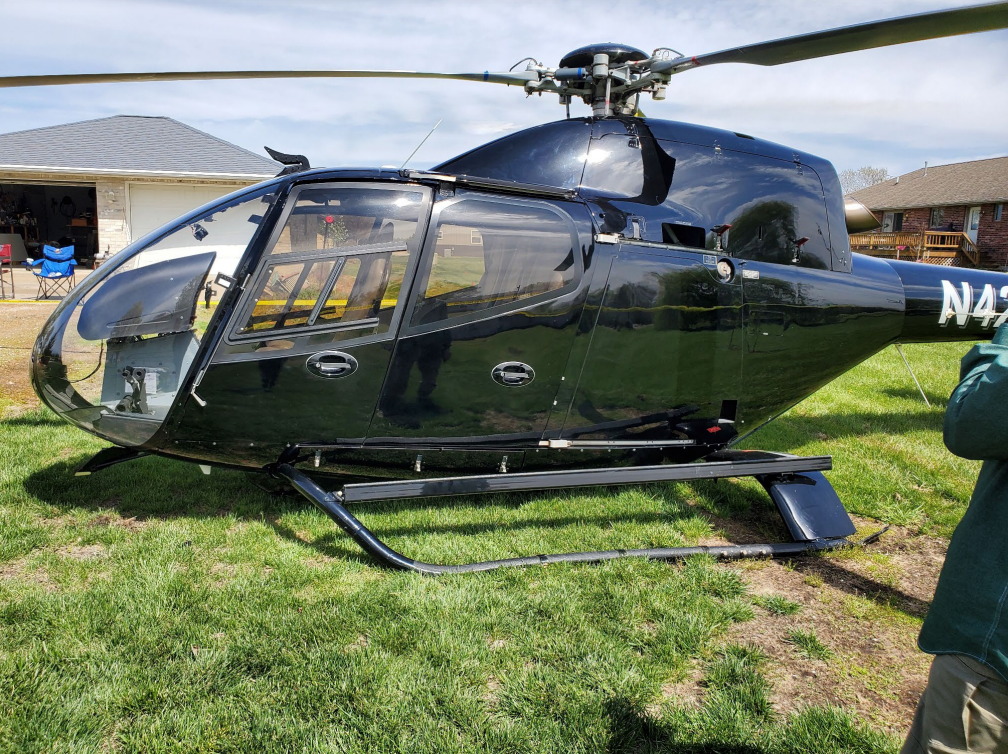
ASN Wikibase Occurrence # 344721
This information is added by users of ASN. Neither ASN nor the Flight Safety Foundation are responsible for the completeness or correctness of this information.
If you feel this information is incomplete or incorrect, you can submit corrected information.
| Date: | Friday 9 April 2021 |
| Time: | 09:12 |
| Type: |  Eurocopter EC 120B Colibri |
| Owner/operator: | Black Wolf Air LLC |
| Registration: | N421PB |
| MSN: | 1403 |
| Year of manufacture: | 2005 |
| Total airframe hrs: | 1435 hours |
| Engine model: | Turbomeca Arrius 2F |
| Fatalities: | Fatalities: 0 / Occupants: 2 |
| Aircraft damage: | Substantial |
| Category: | Accident |
| Location: | LeRoy, KS -
 United States of America United States of America
|
| Phase: | En route |
| Nature: | Private |
| Departure airport: | Topeka-Philip Billard Airport, KS (TOP/KTOP) |
| Claremore Regional Airport, OK (KGCM) | |
| Investigating agency: | NTSB |
| Confidence Rating: |
On April 9, 2021, about 1012 central daylight time, a Eurocopter EC120B helicopter, N421PB, was substantially damaged when it was involved in an accident near LeRoy, Kansas. The pilot and his passenger were not injured. The airplane was operated as a Title 14 Code of Federal Regulations Part 91 personal flight
The pilot and passenger were conducting a personal cross-country flight when the helicopter had a partial loss of engine power while in cruise flight at 2,000 ft. The pilot reported that the engine's free turbine speed and the helicopter's main rotor speed "drooped" and he was unable to maintain the main rotor speed with the collective and cyclic controls. An off-airport landing was made to a residential backyard, during which the tailboom struck the ground when the helicopter landed hard resulting in substantial damage to the tailboom.
Postaccident engine testing confirmed the pilot's report of being unable to maintain the engine's free turbine speed at 100% while under increased loads. Further examination and testing revealed a contaminated fuel injection manifold fuel filter, which restricted the amount of fuel that could be delivered to the engine's gas generator. A laboratory examination determined the contamination was consistent with a cellulose material, and its spectra closely matched that of white paper and white cotton. The engine's main fuel filter also was found to be contaminated and similar contamination was found throughout the engine's fuel control unit (FCU) during disassembly. Laboratory testing of the contamination recovered from the FCU was unable to identify the material as a whole or to its origin.
Based on logbook documentation, the helicopter accumulated 52.4 hours during the 14-month period before the accident, during which the engine's injection manifolds were replaced once, and the oil, main fuel, and FCU filters were replaced twice. The helicopter accumulated 2.9 hours since the oil, main fuel, and FCU filters were last changed about 6 weeks before the accident.
When asked if he was troubleshooting an ongoing fuel system issue, the helicopter's maintainer replied that there were no fuel system issues with the helicopter, and that he routinely replaced fuel filters because of their minimal cost. Additionally, he stated that they never fueled from a non-standard source, such as a steel barrel, or had to transport fuel to an off-airport location to refuel the helicopter.
According to a field representative of the engine manufacturer, the passenger contacted him the day before the accident to discuss a trip that he was making to investigate a reported fuel filter bypass indication and illuminated fuel filter light on the helicopter. The passenger previously told the helicopter's maintainer to inspect and replace the fuel filter and shipped a new fuel filter to be installed. The helicopter's maintainer reportedly did not observe any evidence of fuel system contamination in the aircraft fuel cell or in the engine's main fuel filter. In a subsequent conversation after the accident, the passenger told the engine manufacturer field representative that the helicopter's maintainer told him that the fuel system issues were resolved and, as such, the passenger did not troubleshoot any fuel system components before the flight.
Based on the known information, the cellulose contamination found in the fuel injector manifold filter was likely introduced during associated fuel system maintenance at an undetermined date. The contaminated fuel injection manifold filter restricted fuel flow to the gas generator, which resulted in the partial loss of engine power during the flight. Additionally, the pilot likely delayed entering an autorotation after the partial loss of engine power, which resulted in insufficient main rotor speed and an excessive descent rate at touchdown.
Probable Cause: The contamination of the fuel injection manifold filter due to improper maintenance, resulting in a partial loss of engine power during cruise flight. Contributing to the accident was the pilot's delayed autorotation, which resulted in insufficient main rotor speed and an excessive descent rate at touchdown.
Accident investigation:
 |
|
Sources:
NTSB CEN21LA187
https://aerossurance.com/air-accidents-incidents/engine-maintenance-introduced-fod-that-caused-an-ec120-power-loss/
Location
Images:

Media:
FOD, likely introduced during fuel system maintenance, caused a power loss and necessitated a backyard forced landing. https://t.co/Uo5k8JBhUh #aviationmaintenance #humanfactors #helicopter #flightsafety #aviationsafety pic.twitter.com/LkuYsr6mWB
— Aerossurance (@Aerossurance) August 19, 2023
Revision history:
| Date/time | Contributor | Updates |
|---|---|---|
| 19-Aug-2023 16:33 | ASN Update Bot | Added |
| 20-Aug-2023 13:03 | Captain Adam | Updated |
| 25-Aug-2023 07:15 | Aerossurance | Updated |
| 22-Nov-2023 20:58 | harro | Updated [Other fatalities, Embed code] |
Corrections or additions? ... Edit this accident description
The Aviation Safety Network is an exclusive service provided by:


 ©2024 Flight Safety Foundation
©2024 Flight Safety Foundation